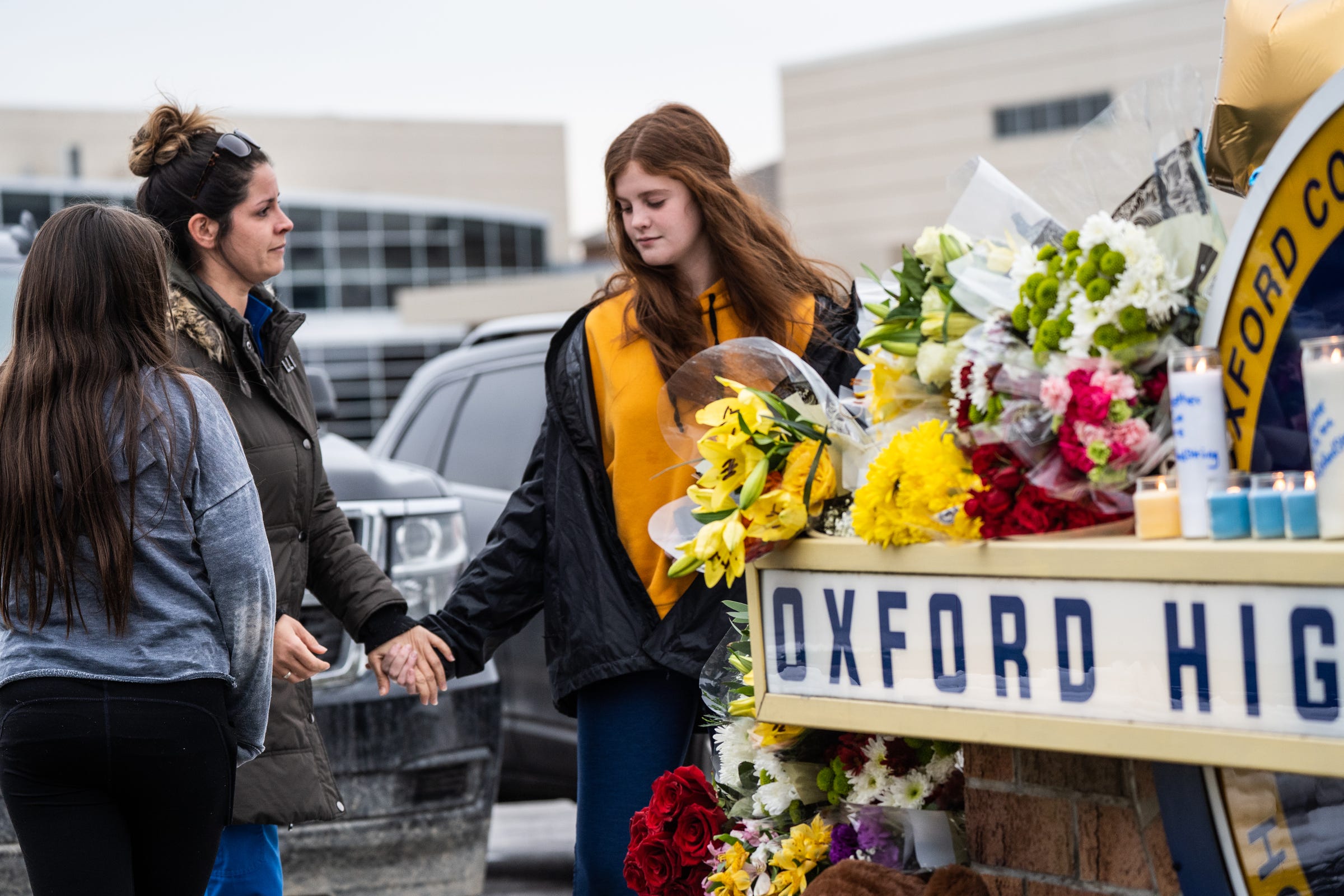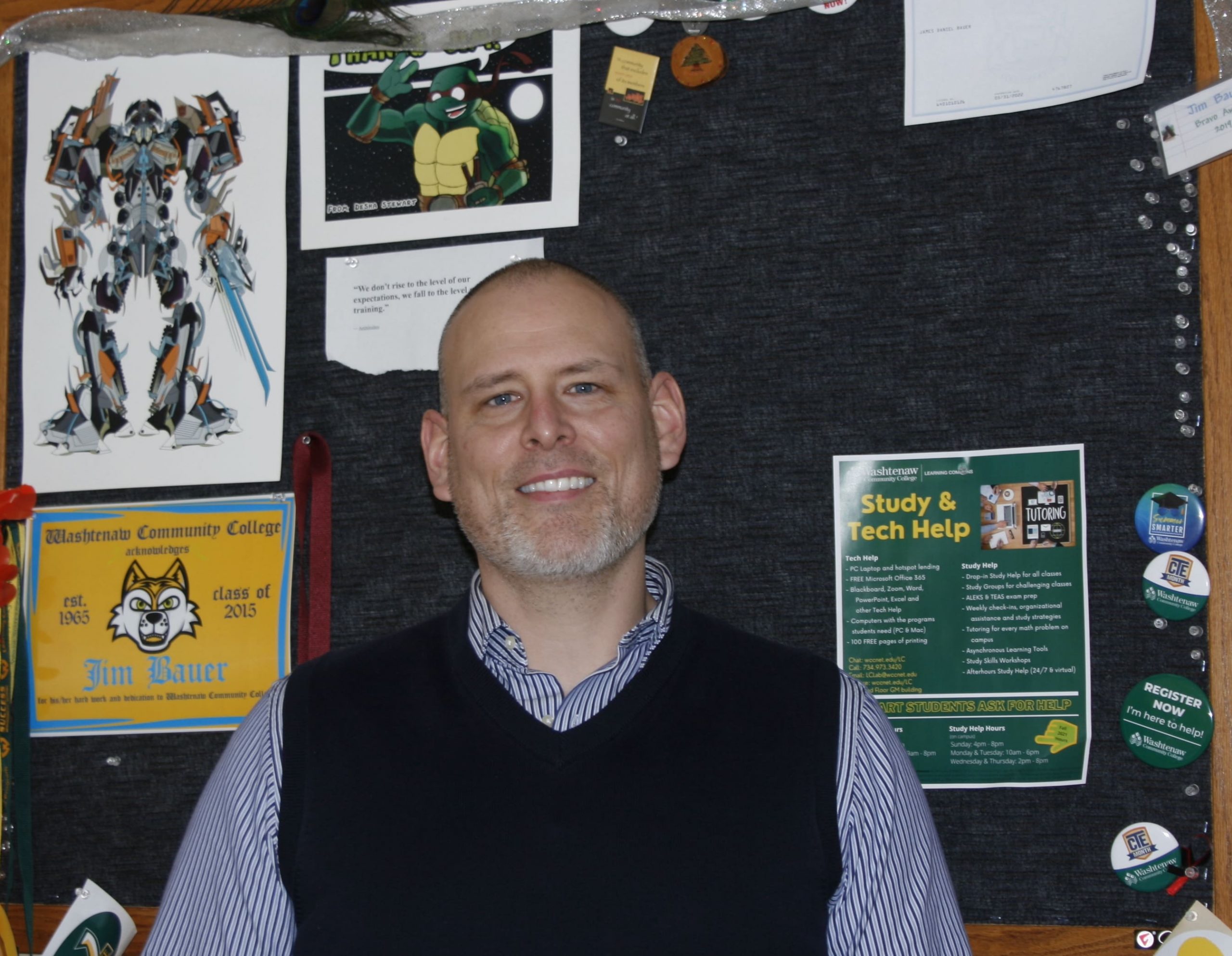
A memorial at an entrance to Oxford High School on Dec. 1, 2021, following an active shooter situation at Oxford High School that left four students dead and multiple others with injuries. (Ryan Garza/Detroit Free Press/TNS)
Let’s Talk!
by JORDAN SCENNA
Deputy Editor
Warning: The following article discusses violence and may be uncomfortable for some readers.
This is the second of a two-part series. Read the first part here.
In the wake of the Oxford High School shooting, the importance of recognizing and addressing mental health issues has once again been fired to the forefront of the gun violence debate. On Nov. 30, 2021, Ethan Crumbley walked into his high school with a 9mm Sig Sauer handgun, and within 5 minutes, killed 4 people and injured 7 others. The morning of the shooting a teacher discovered a hand-drawing of Crumbley’s depicting a semi-automatic gun pointed at a bullet-ridden human body next to a laughing emoji. Below that were the words “Blood everywhere,” “My life is useless,” “Thoughts won’t stop,” and “Help me.”
The teacher brought the drawing to the attention of school administrators but since Crumbley had no history of disciplinary action he wasn’t deemed an immediate threat. After a meeting with his parents, Crumbley was sent back to class, and the administrators told the parents to get him into therapy within 48 hours or they were calling Child Protective Services. That same afternoon, he was to commit the deadliest school shooting of 2021.
The decision on whether to act solely on a person’s thoughts isn’t always clear-cut. Having violent ideations or creating macabre drawings isn’t, by itself, considered abnormal behavior.
“It’s a lot more common than people realize,” said Jim Bauer, a licensed personal counselor here at Washtenaw Community College. “In the world of therapy, intrusive thoughts happen.”
Bauer has been part of the counseling office for almost 8 years, first as an academic counselor, and moving over to mental health as of fall 2021. Avoiding a tragedy like the one at Oxford weighs heavily on his mind, and he thinks the systems WCC has in place can help.
“We don’t want tragedies like Oxford,” Bauer said. “We want intervention. We want to get the students the help they need so they can take care of themselves.”

Jim Bauer is a Licensed Personal Counselor with a Masters of Arts from Eastern Michigan University. Jan Lloyd Hernandez | Contributor
To access help students can go to the WCC website and click on “SUCCEED” followed by “Personal Support,” and then “Personal Counseling.” There is an in-take form to fill out and then someone from the counseling office will contact you. Counseling will take place over 4-8 sessions and will focus on solutions. The counseling office gets anywhere from 10-20 students per week with issues ranging from grief over the loss of a loved one, to a breakup, or even how to talk to a teacher. Zoom and in-person counseling are available depending on the preference of the student. Bauer dispels any notion that Zoom counseling is any less effective than in-person treatment.
“I was nervous about virtual therapy,” Bauer said. “I thought it wasn’t effective, but it’s the opposite. They’re in their home, they have their dog next to them, so they’re more relaxed.”
Saiyara Shaheed, a 20-year-old sophomore in the General Studies program agrees with Bauer. After moving to Ann Arbor from Bangladesh Shaheed found herself in a new environment that lacked a safe space where she could express herself.
“Receiving counselling was the best part of my journey here because it really allowed me to have an idea of what I want in the future. Being virtual, it also was very accommodating to my schedule so I had time to arrange my thoughts before my next session,” Shaheed said in an email.
WCC has dedicated staff and resources to making sure students can address any mental health issue. Shaheed recommends students take advantage.
“I definitely encourage everyone at Washtenaw to make use of this, because mental health is a truly overlooked factor in our day-to-day functioning.”
“Let’s Talk” is another mental health initiative being undertaken by the college. Some roadblocks students face when seeking counseling is the desire to protect their privacy or having a negative perspective on asking for help. “Let’s Talk” is designed to be a short, informal meeting with a counselor where students can ask about the therapy process or get a counselor’s advice on a particular issue.
“This is not a replacement for therapy,” Bauer said. “Anything to reduce the barriers for students; I want that for them.”
“Let’s Talk” is a Zoom meeting that takes place Tuesdays from 12:30-2 p.m. The link can be found in the “College and Community Events” section under the personal counseling tab.
WCC cares
An important question to answer for WCC students is what to do in case you see or know someone who might need help. First, identify possible signs of distress. These include, but are not limited to:
- Self-harm
- Uncontrolled anger
- Hopelessness
- Dramatic mood changes
- Giving away possessions
- Drug seeking behavior
- Reckless behavior (more than usual)
- Suicidal thoughts
- Planned violence
If a student or faculty member has a legitimate concern about another student, they can go to the WCC website and contact the Care Team. The WCC Care Team started as a response to the shootings that took place on the campuses of Virginia Tech in 2007 (33 killed) and Northern Illinois University in 2008 (5 killed). The college wanted to create an intervention team made up of administrators, public safety officers, and counselors. Its intention is early intervention and to provide support for students displaying emotional or distressed behaviors. If you have a concern about a student, you can fill out a contact form at https://www.wccnet.edu/succeed/personal/wcc-care-team/.
The Care Team meets bi-weekly and will assess each report to determine what action needs to be taken.
If you or anyone you know is struggling with mental health issues you can contact the counseling office at 734-677-5223 or fill out an in-take form at https://www.wccnet.edu/succeed/personal/counseling/


